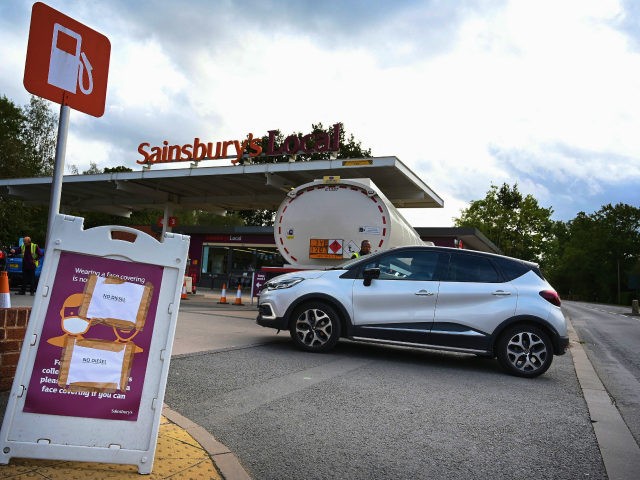Nearly half of Britons blame the media for the shortage of fuel at the petrol pumps while one-in-five blames the government, according to a poll.
A YouGov poll from Tuesday of 3,361 adults in Great Britain found that 47 per cent blamed the media for petrol stations running out of fuel, a criticism made by Reclaim Party Deputy Leader Martin Daubney who said on Sunday that “the petrol panic was fuelled by media hysteria”.
“COVID, climate, Brexit, food/fuel shortages: the media is addicted to catastrophe. And social media laps it up,” Mr Daubney added.
Others made the same observation, including Conservative MP Andrew Bridgen, who said on Tuesday: “Friends of mine in the fuel industry say there is no shortage of fuel and the minor shortage of drivers is the same as it has been for years. This is totally a media ‘fuelled’ panic buying crisis. Interestingly it coincides with the Labour conference. Will they apologise?”
“Even if the driver shortage has been exacerbated by Brexit, the fact is BP announced Thursday that only 13 out of 1,400 fuel stations didn’t get deliveries. That is no crisis. What caused the panic was the media telling people there was a crisis. Media is at fault, not Brexit,” said businessman and former Brexit Party MEP Lance Foreman.
Beyond the 47 per cent who blamed the media, 23 per cent of those polled said that the government was to blame, followed by 22 per cent who blamed the public for panic-buying.
The findings come after former Conservative Party leader Sir Iain Duncan Smith rejected the claims of a fuel crisis or that Brexit had caused the shortage of drivers, blaming instead years of government and industry recruitment failures resulting in the UK, much like Europe, suffering from a shortage of trained drivers.
Sir Iain also blamed the coronavirus lockdown and the resulting closures of driving testing centres and delays in processing licences.
Senior Tory Blames ‘Fuel Crisis’ on the Lockdown and Bad Longterm Planning https://t.co/LqXWrylkbA
— Breitbart London (@BreitbartLondon) September 29, 2021
Duncan Smith further suggested that the government had failed to get ahead on the messaging, robustly and early, that there was not a fuel shortage — which sparked panic buying from members of the public.
Indeed, on Wednesday, The Times printed an opinion piece suggesting that Prime Minister Boris Johnson’s sustained absence for days on the issue — declining to adequately calm concerns of a shortage — did more harm than good, leaving wide open for Labour leader Keir Starmer to stoke panic by claiming during his party conference on the weekend that the country was in “chaos”.
Speaking on the historic shortage of lorry drivers, Duncan Smith said on Tuesday: “We’ve known about a problem in the UK for years. When I was at DWP [Department for Work and Pensions], we had this argument with hauliers: ‘Why don’t you train drivers? Why don’t you make the conditions at work better for them? Make it more attractive for drivers?’ I’ve trained as an HGV driver. I know about the training. It doesn’t have to be as long.
“All of these things could have been done between government and hauliers, but they didn’t do anything. Even in the run up to Brexit, they knew this was going on. So we are now in a situation, bringing in the army when the civil institutions, including business, has absolutely failed in getting any future planning right.”
While older drivers have been leaving the haulage industry, they are not being replaced with new, younger drivers. This is in part down to poor pay and conditions, but also in no small part down to the delays in training, testing, and certifying new drivers. The DVLA, Britain’s certifying body, reportedly has a backlog of 54,000 new drivers, and HGV drivers are waiting three months or more for a test at many testing centres.
"Neither party has seen the benefit of training and retaining UK workers rather than taking the cheaper option of foreign drivers. Now we are beginning to see the folly, but their response is just more of the same" https://t.co/gc3TpCLQbO
— Breitbart London (@BreitbartLondon) September 27, 2021

COMMENTS
Please let us know if you're having issues with commenting.